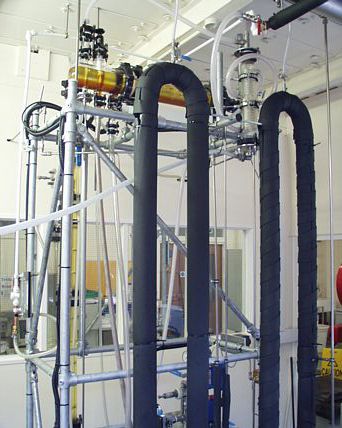The Polymer Processing Research group and the former Polymer Fluids Group have been conducting research on biofuels and in particular biodiesel for several years. Biodiesel is a renewable fuel that is used as an alternative to crude-oil derived diesel. Researchers working in the Polymer Fluids Group have developed a continuous biodiesel pilot plant that has been in operation since 2004, producing at a rate of 25 litres/hour. The process uses the novel Oscillatory Flow Reactor (OFR), an intensified plug flow reactor. The OFR provides thorough mixing of the reactants and sufficient residence time for the reaction without occupying a large area. This makes it ideally suited to producing biodiesel on a small scale, for example as part of a portable production plant. In addition, the OFR is readily scaled up, offering the same advantages in larger industrial processes.
We have studied the effect of residence time on conversion and product quality, whilst also investigating the performance of the downstream separation and purification stages. Using commercial rapeseed oil as a feedstock, we have produced biodiesel that meets the specifications of the European Standard (EN14214) for biodiesel. Work has also been done exploring different catalysts for the reaction and various purification methods, including water washing and adsorbent materials. Research is continuing on the efficient separation of glycerol, the major by-product of the reaction, from the biodiesel.
|
|
 |
| Flow diagram of the biodiesel pilot plant | The biodiesel pilot plant. The Oscillatory Flow Reactor (OFR) tubes are in the foreground with black insulation. Above the OFR is the separation vessel, with the yellow and brown layers of biodiesel and glycerol respectively. |
The research focus has shifted to the cultivation of algae as a source of feedstock oil for biodiesel production. There are widespread concerns that using arable or virgin land for biofuel production increases greenhouse gas emissions and creates pressure on food supplies. Therefore, oil sources that do not place demand on land and food resources are necessary for sustainable biodiesel production. Algae are a potential solution to this problem. Algae have a rapid growth rate, with some species doubling their weight every 24 hours, and they could produce ten times as much oil per hectare as rapeseed. Currently, research at Cambridge is being done to identify the appropriate strains of algae for fuel production. A life cycle analysis of algal biodiesel is being performed to quantify its environmental benefits. Within the Polymer Fluids Group we are developing a photo-bioreactor for growing algae. This is an innovative OFR that uses the unique properties of oscillatory flow to provide the optimum levels of sunlight, carbon dioxide and nutrients for enhanced algal growth. Investigations have also been carried out into the methods for harvesting the algae and extracting their oil, which can then be processed in the existing biodiesel plant. A protocol has been developed for the extraction, transesterification and analysis of the product.
 |
 |
| The final drying stage of the process | The biodiesel product |
Return to the main Polymer Processing Research page


